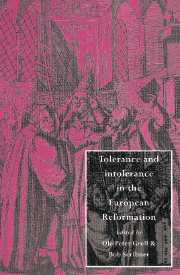Book contents
- Frontmatter
- Contents
- List of contributors
- Preface
- Dedication
- 1 Introduction
- 2 The travail of tolerance: containing chaos in early modern Europe
- 3 Preconditions of tolerance and intolerance in sixteenth-century Germany
- 4 Heresy executions in Reformation Europe, 1520–1565
- 5 Un roi, une loi, deux fois: parameters for the history of Catholic-Reformed co-existence in France, 1555–1685
- 6 Confession, conscience and honour: the limits of magisterial tolerance in sixteenth-century Strassburg
- 7 One Reformation or many? Protestant identities in the later Reformation in Germany
- 8 Toleration in the early Swiss Reformation: the art and politics of Niklaus Manuel of Berne
- 9 Tolerance and intolerance in sixteenth-century Basle
- 10 Exile and tolerance
- 11 The politics of toleration in the Free Netherlands, 1572–1620
- 12 Archbishop Cranmer: concord and tolerance in a changing Church
- 13 Toleration for Catholics in the Puritan revolution
- 14 The question of tolerance in Bohemia and Moravia in the age of the Reformation
- 15 Tolerance and intolerance in sixteenth-century Hungary
- 16 Protestant confessionalisation in the towns of Royal Prussia and the practice of religious toleration in Poland-Lithuania
- Index
10 - Exile and tolerance
Published online by Cambridge University Press: 07 December 2009
- Frontmatter
- Contents
- List of contributors
- Preface
- Dedication
- 1 Introduction
- 2 The travail of tolerance: containing chaos in early modern Europe
- 3 Preconditions of tolerance and intolerance in sixteenth-century Germany
- 4 Heresy executions in Reformation Europe, 1520–1565
- 5 Un roi, une loi, deux fois: parameters for the history of Catholic-Reformed co-existence in France, 1555–1685
- 6 Confession, conscience and honour: the limits of magisterial tolerance in sixteenth-century Strassburg
- 7 One Reformation or many? Protestant identities in the later Reformation in Germany
- 8 Toleration in the early Swiss Reformation: the art and politics of Niklaus Manuel of Berne
- 9 Tolerance and intolerance in sixteenth-century Basle
- 10 Exile and tolerance
- 11 The politics of toleration in the Free Netherlands, 1572–1620
- 12 Archbishop Cranmer: concord and tolerance in a changing Church
- 13 Toleration for Catholics in the Puritan revolution
- 14 The question of tolerance in Bohemia and Moravia in the age of the Reformation
- 15 Tolerance and intolerance in sixteenth-century Hungary
- 16 Protestant confessionalisation in the towns of Royal Prussia and the practice of religious toleration in Poland-Lithuania
- Index
Summary
Exile is an experience very much constitutive of the ‘Second Reformation’, starting with Calvin's own flight from France to Basle in 1536 and ending with the exodus of Calvinists from the German Palatinate during the Thirty Years' War. Furthermore, between these events we have the mass emigration to Germany, England and the United Provinces of members of the Reformed communities in Southern Netherlands and France. Undoubtedly this shared social experience of displacement and diaspora became a central element of European Calvinism.
The connection between tolerance and the exiles of the ‘Second Reformation’, however, is more tenuous. Obviously, the Reformed refugees had good, and perfectly understandable, reasons for their hatred of the Catholic Church, their main persecutor. But Calvin's fear of heterodoxy and his involvement in the execution of Michael Servetus in Geneva would indicate that persecution and exile did not necessarily breed tolerance among Reformed refugees, not even towards other Protestants, in the late sixteenth and early seventeenth centuries.
Thus two related questions spring to mind in the context of exile and tolerance. Firstly, what kind of tolerance did the Reformed exiles expect to be granted by the foreign, Protestant communities among whom they sought refuge, not to mention the tolerance they hoped to be accorded by the governments and Protestant churches under whom they sought shelter? In other words, did the exiles expect to be warmly welcomed in their new countries, and did the host governments consider them a valuable addition to the native populations to whom some form of toleration should be granted?
- Type
- Chapter
- Information
- Tolerance and Intolerance in the European Reformation , pp. 164 - 181Publisher: Cambridge University PressPrint publication year: 1996
- 4
- Cited by



